‘JACK NICHOLSON AND ROCK HUDSON HIT ON ME, I BEAT HALID UP!’ The life story of Olympic champion Ante Josipović
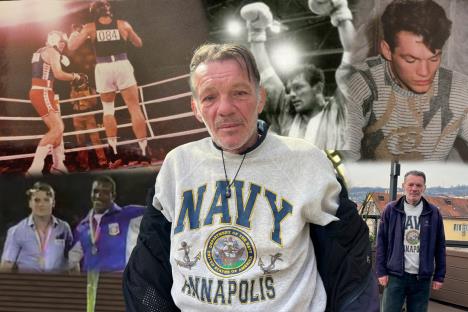
He was the first man from these parts, after Tito, who posed for the cover of The New York Times. He was the champion of Yugoslavia and the Balkans, and an Olympic winner. He was shot at, but he survived. He says it's because the doctors from Banja Luka are the best in the world. He's missing a finger on his left leg – they had to amputate it. He has two sons, from two marriages. He's been through a lot
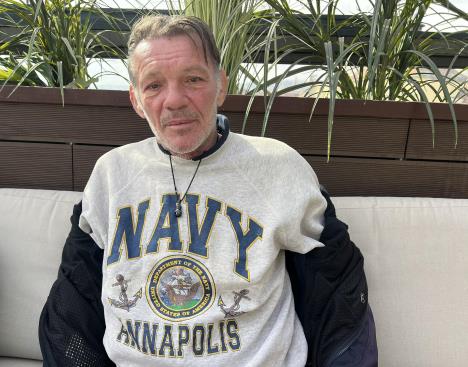
I was born in Banja Luka in 1961. I lived on the outskirts, so I have that rural life in me, life on the outskirts. But let me tell you this, as soon as I started school, we immediately started walking around the city. Even back then, in elementary school, we had our own little groups, here in these streets where we are now. I don't know if you know, you probably do, you've read, in 1969 there was a big earthquake in Banja Luka. Right here where we are sitting now, there was a building that was completely destroyed and a new one was built afterwards. And I remember all the details of that life back then...
Some people say it was better back then, but it wasn't better! Life now is the same as it was back then, but at a slightly different level. Now the world is not at your fingertips but in your hand, the internet brought all of that.
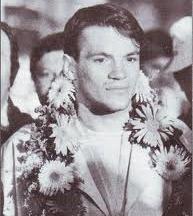
Marijan Beneš Roki
No sport with a ball worked for me; not football, not volleyball, not basketball, I just wasn't into team sports. I wasn't a team player. And then boxing came along. Slavija was a strong club at the Yugoslav level back then, and even at the European level, because we had Marijan Beneš, who was the European champion in 1973 in Belgrade. He was a great fighter, a great champion, loved by the people. He wasn't a role model for me as a boxer because I couldn't do what he did. Only he could do that, that's why he's unique. I called him Roki.
I had to learn boxing, I had to box in a way that minimizes risks because I was physically weaker than my peers and most of the opponents I boxed against. And then you have to compensate for that with speed, virtuosity, technique. Boxing is a very difficult sport to learn. But by chance, Predrag Krstić from Belgrade appeared, a top boxing coach. He was the champion of Yugoslavia at the time with our club Slavija and he kept everything under control. His counterpart in Belgrade was Čitaković from Crveni Krst, and he was from there. He showed up and noticed a few of us, two or three of us who were talents for him. Then he started guiding us a bit, directing us in life. We go to Belgrade for a tournament, we go to Zagreb. I was 16 or 17 years old at the time. I started boxing at 14, still in elementary school, and then these big guys come along, take you, suddenly you're at Slavija, you go to Pavika's and to Četvorka. Pavlović was a former player, I don't think that café exists anymore... Everyone used to come there. Then you go to the first cafes that were in Belgrade, on Knez Mihajlova Street. There was a place called Papagaj, and then Galerija after that... You start trying out all of that...
Father
I lost my father very early, when I was eight years old. My father Petar lived from 1930 to 1970. So, he died at the age of 40, in his prime. He had lung cancer. He was taller than me by a head, he was a cool guy, a father to wish for, and then suddenly everything collapses...
I had two older brothers, luckily, because they grew up before me and they started working earlier, both of them were serious, and still are today. Thank God, they're alive. Their names are Ivan/Ivica, and Boža. My mother's name was Albina, a combination of Italian and ours, very specific. There were three of us and I, as the youngest, wanted to do anything to show my father who was already... How difficult it was... I wanted to prove to him that I would be the one... That I would be successful in something. Thank God, it turned out that way for me.
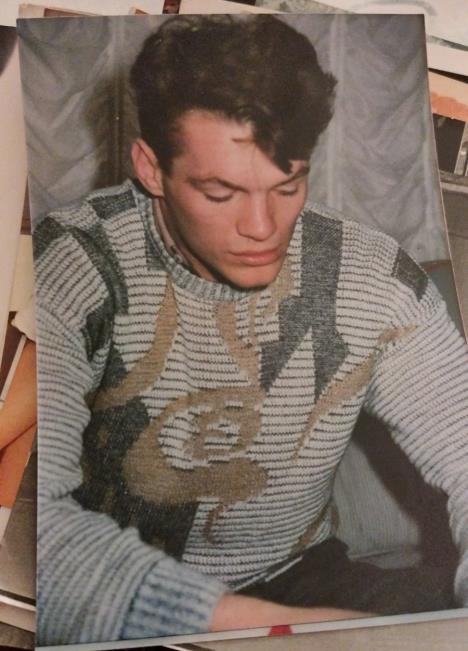
The Belgrade days
That lasted a long time, I don't know, since 1979, when I joined the first team, when I became a regular first-league player. At that level of league, competition, everyone had their teams, all clubs had 12 guys when they went out, so there was a fight. I remember those beautiful evenings at Crveni Krst, at the open stadium – Radnički. All the Belgrade tough guys used to come there, and bohemians, like Gaga Nikolić, for example. And Mrka was there, Milutin Mrkonjić, he also lived in that area. And Branko Pešić was there too, an old gentleman, the mayor of Belgrade. He also loved boxing and even did some boxing himself.
Prvi uspesi
Not counting those junior competitions, that was until 1982, 1981. I beat everyone in that league, except one opponent. I had about 25 matches in a year, and I won them all at club competitions. Then, in 1982, in Vukovar, in that unfortunate place, I became the champion of Yugoslavia. And declared the best, the most promising boxer at that time, perhaps even in Europe. By then it was already the middleweight category, 75 kilograms. But until then, I’d changed all weight categories, from the lightest, from 50 to 75. And then the successes in those larger categories started and I reached my physical peak, where with 75 kilograms you can achieve everything, endure all preparations. We went on training camps two or three times a year. We went to Kopaonik, Jahorina, then up to Slovenia for winter mountain camps, sometimes even to the seaside. Then most often to Košutnjak up there because the sports centre was intended for that. Then you had experts there. I had, for example, Professor Ćirković, who is still alive today, thank God. He was a friend of the first great champion, Mate Parlov. Professor Ćirković was a conditioning coach, the best in Yugoslavia of all time; and still is. I don't think there's anyone better than him now. The man is already elderly. I hear from him sometimes, I’ve even seen him now on podcasts a couple of times. He has gathered a team of serious people.
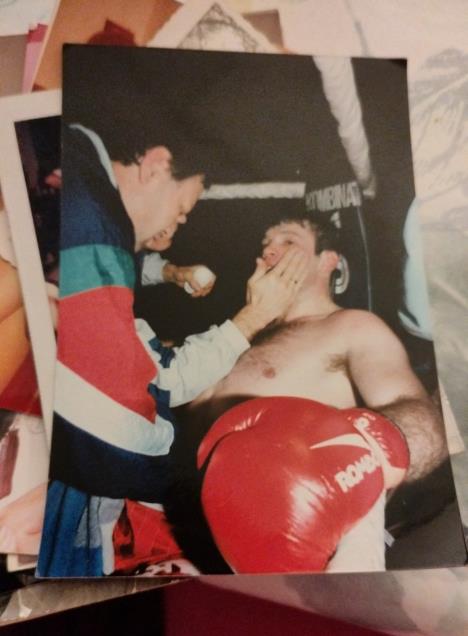
Street fights in the capital
Now, we had Mato Parlov in Yugoslavia, who was the world champion in 1972, and in 1974 he was an Olympic champion. He was the world champion in Havana, then he became Olympic champion in Munich. After Mato Parlov, Slavodan Kačar appeared, who was also an Olympic champion in light-heavyweight in Moscow, at that quite tough Olympics. And then came my time, when I competed against Peškaro, Jevtić, Kačar. We were all light-heavyweights. That was the Yugoslav category, and we were all there. Maybe that's the Balkan system where people weigh from 75 to 90 kilograms, the best for that sort of sports constitution. There was even greater desire for success. When they say that life was good, no, it wasn't that good. It was life, and whoever was in a situation to have something extra lived a little better. The working class lived the same as now, it is always similar. That's why I say I had the urge to go to London, Paris, New York. There's nothing more here for you, you can't count on any business here. There's nothing else that can lift you up in the world. Eternal thievery exists, but I'm not that type. I won't take what's not mine, I'm not cut out that way. I already knew there were our criminals walking around Paris. I knew, for example, about the Stevica Marković-Alain Delon affair because he went to Paris from Crveni Krst. The whole crew, from Ljuba Zemunac to Ćenta, Darko Ašanin. They all trained at Crveni Krst with Mr. Ćitaković, who was a fair-play champion.
Nobility was a sort of goal in those street fights. Street fights in Belgrade had already started, i.e. arranged fights, it was well-known. Regulations were known even on the street. It was known how to do it what was possible. And whoever broke the rules was punished. The punishment was either humiliation or, for example, as it happened, and Arkan also knew about it, to take a shovel and hit the butt five times. And that was terrible, it hurt.
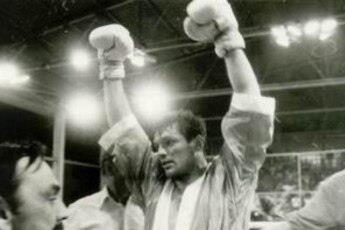
Munich
Now, in 1982, I become the champion of Yugoslavia and a national team player. Then you go to tournaments in Europe. I was also the Balkans champion in 1983. I was at the World Championship in 1982 in Munich. And so, we come to Munich from that Communism, and Munich is full of everything. Full of whores, full of our people, already living there. The late Bora Novaković, he died two years ago, he already owns bars in Munich. Ćenta, Ašanin, and Zemunac would come there. They’d come from Frankfurt, as they were there at the time, and then they go down to Munich. And then when they come, they bet with those German pimps, all the people who run those night bars and businesses and gambling..
And then I first defeat that German, a local from West Germany. He was a policeman by profession. And then our guys from Yugoslavia come, there were a few guys from Zagreb, Ljuba Zemunac's godson and the late Jusa. And they put money in my pocket. I'm getting dressed, my arm's broken, the bone, so it hurts, and I can't go on, but I won. I had about 200 DM at that time, and I want to buy myself that Walkman, a Seiko watch, but I can't buy it all for myself, because I don't have enough money, and suddenly I have four or five thousand DM in my pocket. I never saw more money in my life. And I say to them: "Guys, what are you giving me?! I'm scared! What's going on?" They tell me they bet with the Germans, that I won, and that it's only fair that I get a share too. They knew we didn't have much. That's how I fell in love with that way of life, and I will never say anything bad about Ljuba Zemunac, Darko Ašanin, or even Arkan to this day. Everyone's against him, but I find it nice that his son Veljko is a boxer. I think highly of him. He has a strong hand, he has big bones, he won't take a cunning punch, and that's the only real quality for boxing. To take as few beatings as possible, and to give as much as you can, as much as you can and have to. I say, the only rule is to get as few beatings as possible. It's tough.
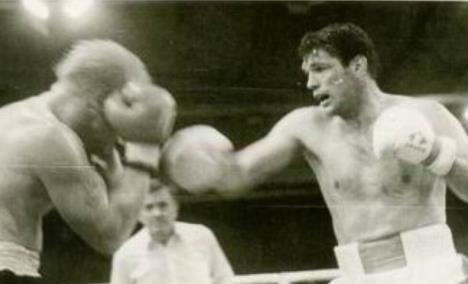
The Turkish guy
And then better things started happening. For example, in 1983, I go to the Balkan Games, I beat them all down there – Turks, Greeks, Bulgarians, all of them. And then one Turk, a rich guy - we didn't have those tycoons back then - comes and says, "You and Radžepovski from Macedonia, come to my estate in Ankara and box against my Turks whom you defeated, give them a rematch, and I'll give you 50,000." Let's say he offered us that much. Oh, damn, our Communists jumped two feet in the air: “You can't do that! Only the whole national team can!” But he doesn't want that, he wants only the two of us, and they won't allow it. And back then, we didn't even know what money was because nobody had a lot of it.
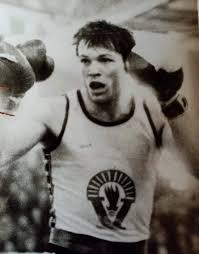
Don King
Something similar happened to me in Los Angeles, for example, when Don King came to me after the semifinal match, at the announcement, when that thing with Holyfield happened, the disqualification and announcement, so he comes to me, with his hairstyle, without a shirt, with chains around his neck, and says: “You, kid, stay here in America, you'll get... I don't know... you'll get a million dollars! You'll have ten matches, we'll arrange a rematch with Holyfield for you.” I'm looking at him like that, and Mato Parlov, who was the coach of the Yugoslav national team at that time and knew what was going on because he was a world champion before that, tells me to stay in America. And I'm like, would you look at that fool! Stay in America?! I'm going back to my Banja Luka, screw America, screw everything. I turned down Don King!
I'm telling you, I want to go to Yugoslavia, I want to go to Banja Luka, I want to go to Belgrade, I want to go to Zagreb. I love life, I have my girls, I have my buddies, damn it. And I didn't believe that someone could get a million dollars. I got it afterwards when we analysed it. I dismissed him, I said, "Come on, at least put on a shirt and tie." He was already a king back then. They held professional matches in Trump's hotels. Mato Parlov is looking at me, I remember it well, and he says, "Oh, you crazy Bosnian! The man offers you a million, nobody ever got a million dollars for signing a contract! Nobody ever got it, not because you're so good, but because you're white. They need a white man who's worth something. Americans need a white man, they have as many blacks as they want." I say, “It'll all come around, money isn't that important.”
Boo, boo, silence and applause
Holyfield boxed in the semifinals with some Brian from New Zealand. He hit him afterwards, so he was disqualified. The one who's disqualified doesn't receive a medal, he's punished, that's the rule in boxing. However, the Americans put pressure, they always were powerful, as they are now. They pressured on and he still got the medal at the announcement. So then my people, who were with me, the ‘security guys’, as I call them – they were people from the state who controlled what was done, how things were implemented. Then they say to me: "Put him on the podium, hug him, wave your flag, and you'll get an applause, the audience will accept you." We go out, everyone's booing, everyone's for Holyfield. He's theirs and, among other things, a true champion. What he did wasn't intentional. Suddenly I heard: "Boo, boo!" and when I hugged him; there was only silence and then – an applause! So we did it right and returned.
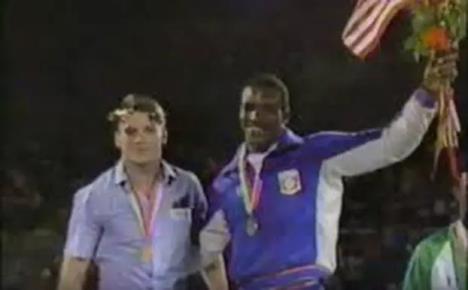
Olympic Gold
You experience a big shock. I came to the Olympics with the desire to win at least the first match. Then when you win the first match, the appetite kicks in, then the second, then the third, then the fourth... And pride. We were big patriots. The first thing is pride, and the second thing is still a big blow to the young brain. And when all that happened, then I see the people as well. And the people are strange and greedy. Then you have some people who want to exploit you and who are willing to do something malicious behind your back. But I didn't really deal with that much. Thank God, even today I have, as I had then, enough people to socialize with who are not malicious and who are not sick. When I received that Olympic recognition, my life changed. Everything changed fundamentally. The first thing, I didn't think about money. There were already cash prizes at that time, but it was all up to 20,000-30,000 at most. I spent that money every day. You get the wrong idea about life. I wasn't afraid that I wouldn't have anything to eat tomorrow. I always thought that it would never happen again that there would be nothing, and we all experienced that in our families, in our lives. That sometimes there's something in every house, and sometimes there isn't. And now, for example, when I've grown enough, only now do I see what money means, what power means, and business; I'm telling you, back then we didn't know what a million of something meant. Ninety-nine percent of people in Yugoslavia didn't know what that meant, and they didn't need to. We had that Communist delusion that led to what we have now. Now, more or less, we all live poorly.
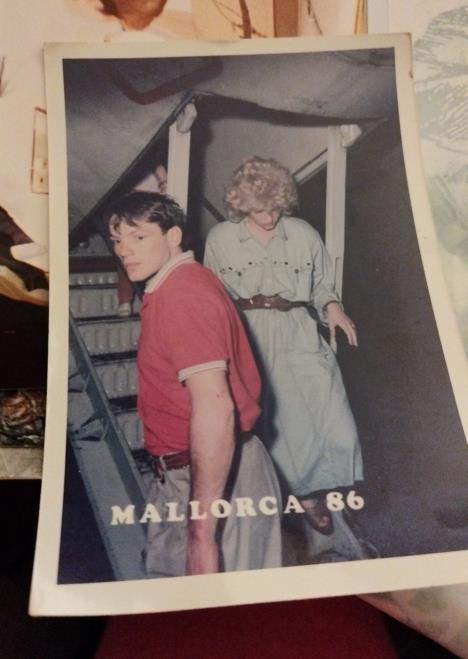
My wife and son
I fell in love already in elementary school. I had some beautiful girls there, and then there were these crushes happening around the city, in those cafes, so I got married for the first time. She was the daughter of this one jeweller, who was a rich man. And immediately everyone started talking behind my back again that I got married because of money and gold. I never got anything from him. He offered me to work with him, and I heard from the old people again - gold is cursed, it's cursed. Gold is the greatest evil that can exist in the world. Gold and drugs, they're close. That woman was beautiful, I was young, popular, so that complemented each other. And of all that, I had a chain, which I returned when we divorced. How long did that marriage last? From 1986 to 1996. And that's too much. Then I got my son Tomas. He is now with his mother, living in Medelin, down in Croatia. My first wife's name is Irena.
Halid Muslimović
I boxed in a few more championships. And then Halid Muslimović appears, who marries my sister-in-law, the younger sister. I call him a pathetic man, because he's pathetic in every way. And he persuaded me to start organizing and founding a federation, and to start organizing professional matches at the Yugoslav level and to be our own bosses. That was in 1990. And I went to Laktaši to Milorad Dodik. He had become the mayor of Laktaši by then. We were in friendly relations, the same generation... I tell him, "Mayor, I have this idea...” He had already reduced taxes a bit in Laktaši, where he was the boss. And he had attracted private companies from all the other federal units. I said, “Mr. Mayor, I am suggesting that we set up a pro-camp here.” He said, “Write down what you need, and we'll sit down and discuss it.” Mile is such a man. The next day, I went to him, we had coffee, we had breakfast or something. I said that I needed a hall, equipment, a federation at the Yugoslav level. He already had good relations with Belgrade by then. There was Ante Marković, the reformist, in power then. Before Milošević, that team. He told me that we would go to Belgrade and that he would arrange those meetings for those federations, that everything would be regular. Mile Dodik is the first representative of the first professional boxing federation at that time. We did all that. I started organizing matches already.
Halid and I did that. It was going well. However, I wasn't interested in money. Halid had this publishing house Haliks. He took everything for himself. We filled halls everywhere we went. People still love me to this day. When I walk down the street, every other person greets me here in Banja Luka, where the structure of people has changed. And these new ones who have come, the war did its thing, but I don't have a big problem with people. We made good money then, at that time.
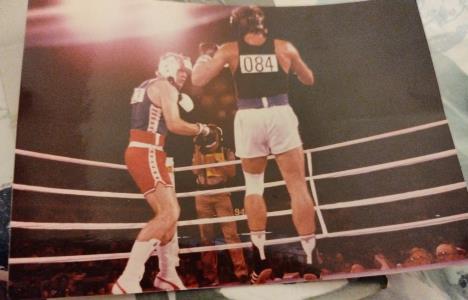
Everything stops
End of 1991. The breakdown of that country had already begun, and in 1992 the war was serious. Suspension of everything, everything stopped. Then in 1993 I went with Halid to talk. He divorced his wife. He divorced my sister-in-law first, but he's still borrowing money. I tell him, "Where are you spending all this money?" He took it from everyone, even from his mother-in-law, he robbed her too. There is no one he didn't rob. It disgusted me, so in the end, he started borrowing money even from loan sharks. And then I called him, in 1993 or 1994. One of my friends, Stavra, was in Switzerland at the time, a Pančevo man, Šešelj's bodyguard... And a thief came from here, our local loan shark, and said, "I came to kill that dude for you." I told him that he's my former dude, and he says he didn't return 50,000 euros to him. He told me that he took it from him two years before, and I didn't even know. You don't take money from loan sharks. You take money from a bank, you take money from... You took it from a friend, from family, but when you take money from loan sharks, then you know what happens. Either the interest is returned, or you get tied up. They came to Switzerland to kill him. And this guy took 50,000 from Izet Beganović before the war. And Izet came and hired two guys, Stavra from Pančevo and another guy, to do him in there in Switzerland. I say, “Don't.”
However, I didn't know that Halid had been pulling fast ones on singers too. He only didn't manage to pull a fast one on Lepa Lukić because she's a bigger bandit. He defrauded Goca Božinovska, Šemsa Suljaković, Vesna Zmijanac... And he slept with all of them. He took money from all of them to produce some material, to do this, to do that... Šemsa Suljaković is a terrible person, a terrible individual. She came to Vienna, I met her in Vienna, the poor thing was waiting in line to get Bosnian bread. And then she told me the story. He took about 20-30,000 DM from her. It's shameful. He still owes me at least half a million. Half a million, at least, if we were to make a bottom line. However, there's no one left to talk to about it. When I had a falling-out with him, I told him: “Listen, I'm going to hit you once, then twice, then three times. Why? So that we don't sit, so that we don't eat, so that we don't have lunch, and so that we don't do anything in life!” I hit him. And that's the only violence I've ever had in my life, that I beat him up. And I don't regret it. Halid is a man without shame, without character.
Two sons
I have a son here in Banja Luka with my third wife. He's 17, I see him every day. His name is Luka and he's almost two meters tall. I also have one in Switzerland. I was married there to a lady named Olivera, for five or six years. She has a son from a previous marriage, but he's also her son. Her son is Kevin, who's already a young man. The first son tried to train boxing, then I discouraged him, so he went into football. The little Kevin in Switzerland, he's already employed, doing his job. The youngest one has no desire to do anything. He's just on his phone.
Men are a strange and foolish bunch. Due to pride, a man does all sorts of things. But I’ve always ended everything with an agreement. There were arguments, but no violence. Who would I hit?! A woman?! Never! Any agreement was better than a war. All the agreements I made with women, I made to my own detriment.
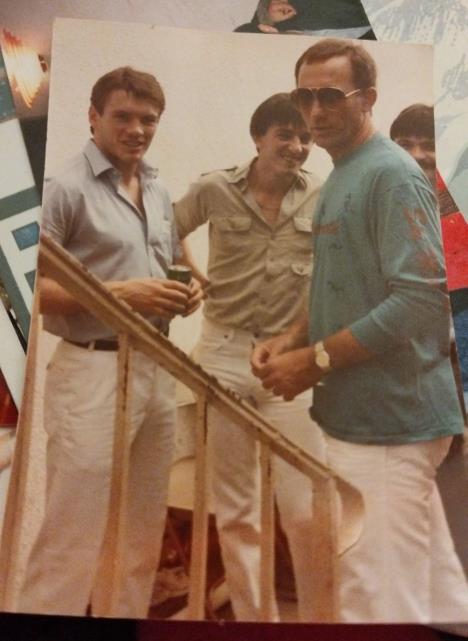
Injury
In 1991, I went to Italy. I first went to Switzerland, and then we had a failed match there. I was still working there with Halid. So, I got pissed off and went to Italy. I was in Rome in 1992 and returned to Vienna in 1993 because my manager in Rome went bankrupt. A wonderful man. And then, when the war was ending, I went to Zagreb. To be closer to Banja Luka, because I'm a big patriot. I love Banja Luka, damn it. I don't have any problems. Banja Luka loves me. And I moved to Medulin, down in Istria, when I saw that the war wouldn't end soon, regardless of the fact that there was no shooting, people still argued among themselves. So, I lived for a couple of years in Medulin until I divorced my first wife. Then, I came to Banja Luka for the first time after the war, there was some tournament. And there, some idiot shot at me. It was in 1997. They found some idiot who was instigated by the State Security to do it, saying he would be cool and gain some reputation. He fled to Belgrade and continued his life. At that time, Biljana Plavšić was the president, Milorad Dodik had a post close to her. I only know that I woke up from a coma, and as for that woman, I only have the best to say. I regained consciousness, and she was patting my hand, telling me, "Son, you'll recover, you're healthy and strong, I wish you all the best." The doctors were extremely fair to me; I still love Banja Luka doctors, and I claim that Banja Luka doctors are the best in the world. I was recovering for a long time; I had a serious injury. It happened in a cafe. Suddenly, without any reason or cause. I saw later that it was done at the instigation of some service, something like that. There are several reasons for that. The first thing was political, as people were returning to their property. It was necessary to intimidate those who were non-Serbs, who were coming here, to scare them, to show it was unsafe. Then there's also a political reason, because my first wife's parents were killed, my father and mother, and two more, and they were robbed. And then, they were afraid I might investigate something, interfere. Yet, I had no intention to get involved in that because I always said that gold is cursed, gold in war. So, what do people do in war? They plunder, store jewellery...
A gift from Ali
I got this hoodie from Muhammad Ali. Ali was already sick then, and he came to my matches, followed everything. Around him, there were people who took care of him. He already had Parkinson's disease, so his hands were shaking; he didn't know where he was anymore. I felt sorry for him. His hands were shaking; he couldn't even sign his name. And then I saw they were exploiting him, there was a gang around him. I can imagine what it was like before when he was strong. He was already bankrupt then, he didn't have money. But I can imagine before, when he had millions, what they did around him. That's why he didn't have millions anymore. He gave me the hoodie... Hundreds of shirts, this was his company, which ceased to operate when he stopped. That was in 1984. Sometimes I wear it. He was Jordan's forerunner. I was so angry that I didn't even take a photo with him.

Jack Nicholson
Jack Nicholson comes, he wasn't interesting to me, nor handsome, because he was gay. These hostesses who were there and working told me that Jack Nicholson invited me to a reception. After the second, third match, after the final, he invites you to a reception at his villa. And then that girl tells me, the Đujić girl, the granddaughter of Priest Đujić, a smart and wonderful girl, she’d already fallen in love. We were already going to her apartment from the Olympic Village since our rooms were triple at the USL University. And she tells me, you can go, it's not bad. That's the top. However, she says, his first neighbour is Rock Hudson. Rock Hudson, and they had villas right next to each other, was the first guy who got AIDS. And both were gay. And Nicholson loves boxing, and he's there for every match. And now I say: screw him and his party. What do I need his party for, I'm not gay. And this girl of mine, she tells me they wanted to slip me some drugs because I'm a healthy athlete and gangbang me. They are world players who saw me as a trophy; I was interesting to them. And I didn't go. Diana Ross and Whitney Houston watched my matches... They played for us in that Olympic Village.
He pulled through
I was perfectly healthy for 60 years. I never had any problems, except for sugar, which came from stress, from that tumultuous life. Gangrene appeared for the first time last year, and it caught me in two days. On Friday, I saw the doctor, my friend from the Medical Centre in Banja Luka. Vlada Džajić, who is a genius and a good man. We met here in the city. I said to him: "Doctor, something is tingling in my feet... It doesn't hurt me too much; one toe’s turned red.” He says I should come on Monday; it was Friday. Saturday, it's already red, it starts to swell, and by Monday, it's already black. I immediately went to the hospital; they tried for seven days with therapy and infusions. It didn't work; one toe had to be removed from the right leg. I said: "God forbid it went further, to hell with one toe. There are nine more."
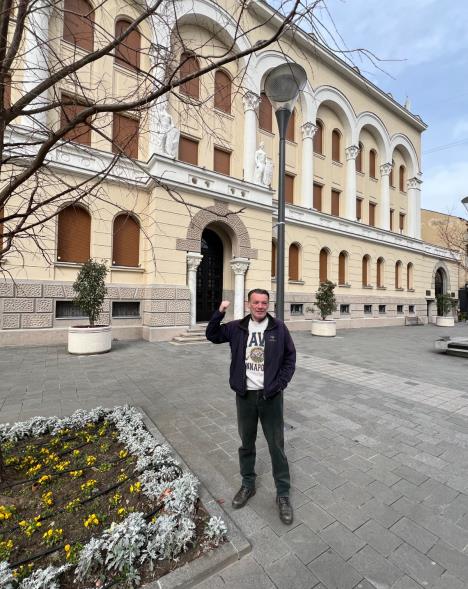
Banjaluka
Banja Luka was the most sports-oriented city in the world. I'm the only person from the former Yugoslavia who appeared on the front page of The New York Times after that final. I appeared, and Tito before me. And no one has ever been on the front page of The New York Times. You have a situation where those 40 years need to be celebrated now. We here in Banja Luka organized that grand welcome when we returned from LA. There were 30,000 people. Percentage-wise, in terms of the population, Banja Luka had a hundred and something thousand people, and you have four medals, damn it, three gold, one silver. Paris didn't have that, London didn't have that, New York didn't have that, nobody had that.
To Be Remembered
Well, I have nothing more to tell you, and this is quite enough... But, okay, let me tell you this when you ask: I would like to be remembered for always being cheerful. Even when things were toughest for me. And to be remembered as a fair man who didn't make anyone unhappy. I lead a bohemian life even today. But I haven't ruined anyone's life. Not even women’s.
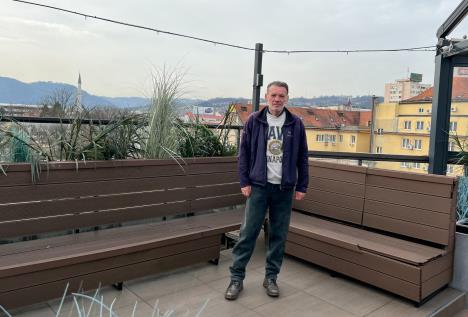
Kurir.rs
In accordance with the WMG Terms of Use and the Law on Public Information and Media, unauthorized copying of part or all of the text and/or media without indicating and linking the source and author and is prohibited.